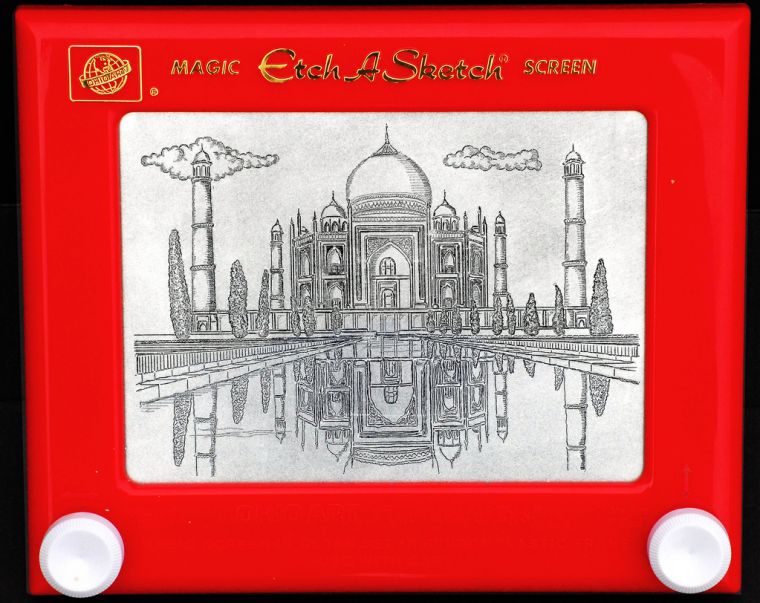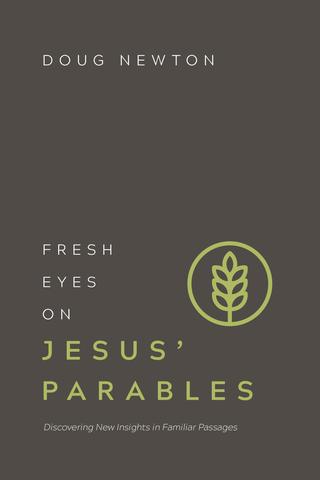Fresh eyes on Jesus' parables: 'Hello, Turkey'
Before there were iPads the closest thing we had to an attention-grabbing flat screen instrument was an Etch A Sketch. Remember? Turn two white knobs that moved an inner stylus against the backside of a gray screen, leaving a black line? Then erase the screen – how? Turn it upside down and shake it vigorously.
This is similar to what we often must do with our minds in order to see something new or even better in a familiar Scripture passage. Case in point: 'The kingdom of heaven is like treasure hidden in a field. When a man found it, he hid it again, and then in his joy went and sold all he had and bought that field' (Matthew 13:44).

One common interpretation has been Etch A Sketched into our minds by preachers dialing in this point: the kingdom of heaven is such a precious treasure that we, like the man, should give up everything to lay hold of it. Of course, that's absolutely true – but probably not what Jesus was talking about. So let's flip our minds upside down, shake out the old teaching, and ask the Holy Spirit to help us discover something new.
The first thing you must do whenever you approach a parable that begins 'the kingdom of heaven (or God) is like...' is to put the parable's elements inside a parenthesis, so that the phrase 'kingdom of heaven' applies to everything that follows. The kingdom of God is not like any one element in the parable, such as the treasure. Rather, the whole picture shows what the kingdom of God is like: The man finds treasure, hides it, joyfully sells everything, and buys the field. Given that basic rule of interpretation, we cannot interpret this parable the common way, ie the kingdom of God should be like a treasure to us.
You might then be tempted to ask: 'So what is this parable telling us to value so highly that we would give up everything to obtain it?' Here's the bad news. If you ask the question that way, you'll never arrive at the answer, because you would be making an unwarranted assumption. Let me explain by telling you a story.
For more than 30 years I have asked groups to solve the following '20-questions mystery'. Mary lies dead on the floor. Tom is asleep on the couch. A colorless, odorless liquid surrounds Mary's body and broken pieces of glass are also scattered around her. The windows and doors are all locked from the inside. What happened?
The groups always start out with the same kinds of questions. Someone asks, for example, 'Has Mary been dead a long time?' And voilà – their fate is sealed with the very first question. Why? Because from the beginning they are assuming Mary is a woman, due to the name Mary.
Once I get them to question that assumption the solution comes quickly: Tom is a cat. Mary is a goldfish. Tom knocked the fishbowl off the table, it broke, and Mary died.
In the same way, our unwarranted assumption about 'the man' in this parable keeps us from understanding what Jesus was teaching about God's kingdom. Here's your hint: Who are you assuming the main character to be? What if it's not about us giving up everything to obtain the treasure? What if Jesus is the man who finds the treasure? What if we human beings are the treasure? What if the field is this world that belonged to Satan, the former prince of the world? And what if it is Jesus who gives up everything He owns to purchase (redeem) this world and reclaim us as His possession? What if that's what the kingdom of God is like!
This one sentence parable with its three verb phrases seems to condense several verses about Jesus' death found in Hebrews and Paul's letters and supports this interpretation:
... then in his joy went – 'For the joy set before Him He endured the cross...' (Hebrews 12:2).
... and sold all he had – '[He] did not consider equality with God something to be grasped, but made Himself nothing ...' (Philippians 2:6-7).
... and bought that field – 'You are not your own; you were bought at a price' (1 Corinthians 6:19–20).
True, we should treasure God's kingdom enough to give up everything to obtain it, but this parable reveals something better: it tells of the lengths to which Jesus will go to make a person, any person, his.
One Sunday after church a tattooed young mom came up to me and asked, 'Why did you look at me during your sermon and say, "Hello, Turkey"?'
I had no clue what she was talking about. 'Why do you ask?'

She went on to talk about her troubled, drug-addicted life, but how she had been very close to her recently deceased grandmother. 'Before she died I said, "Gramma, if I ever get back on the right track and you can see me from heaven making good choices, will you somehow tell me, "Hello, Turkey"?' (Apparently, her grandma's pet name for her.) 'This morning I clearly heard you say, "Hello Turkey". So I'm thinking I must be on the right track.'
'I didn't say that, but Jesus knew you needed to hear those words.'
She was dumbfounded. And I was able to introduce her to this Jesus who does miraculous things to seek and save the lost – the buried treasures of this world. That's what this parable is about. Our Lord looks at each of us as a treasure, and He will stop at nothing – pay whatever price is necessary – to help you become his possession!
Once you belong to him, it turns out you are like an Etch A- Sketch. He lovingly turns your life upside down to erase sin, shame, and every mark left by the devil in your life, leaving you with a clean slate and heart that he writes on by His Spirit.
'Fresh Eyes on Jesus' Parables' by Doug Newton is published by David C Cook.
Doug Newton is the cofounder and director of the National Prayer Ministry of the Free Methodist Church-USA. The author of nine books, he served for 30 years as a senior pastor and for 15 years as editor of Light & Life magazine.











